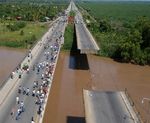Haïti-Séisme :CNN: Earthquake in Haiti ; could be ‘catastrophe’
A major earthquake struck southern Haiti on Tuesday, knocking down
buildings and power lines and inflicting what its ambassador to the
United States called a catastrophe for the Western Hemisphere’s poorest
nation.
Witnesses
reported heavy damage throughout the capital, Port-au-Prince, including
to the president’s residence and century-old homes nearby, and The
Associated Press reported that a hospital collapsed. President Rene
Preval is safe, Joseph said, but there was no estimate of the dead and
wounded Tuesday evening.
The magnitude 7.0 quake struck about 10 miles (15 kilometers) southwest
of Port-au-Prince shortly before 5 p.m. Joseph said one official of his
government told him houses had crumbled “on the right side of the
street and the left side of the street.”
“He said it is a catastrophe of major proportions,” Joseph said.
Frank
Williams, the Haitian director of the relief agency World Vision
International, said the quake left people “pretty much screaming” all
around Port-au-Prince. He said the agency’s building shook for about 35
seconds, “and portions of things on the building fell off.”
“None
of our staff were injured, but lots of walls are falling down,”
Williams said. “Many of our staff have tried to leave, but were
unsuccessful because the walls from buildings and private residences
are falling into the streets, so that it has pretty much blocked
significantly most of the traffic.”
Many of the homes in Port-au-Prince are concrete-block structures
built on steep hillsides. Mike Godfrey, an American contractor working
for the U.S. Agency for International Development, said “a huge plume
of dust and smoke rose up over the city” within minutes of the quake —
“a blanket that completely covered the city and obscured it for about
20 minutes until the atmosphere dissipated the dust.”
The quake
was centered about 6 miles (10 kilometers) underground, according to
the USGS. A magnitude 5.9 aftershock followed soon afterward, about 30
miles further west, followed by a 5.5 aftershock closer to the location
of the first quake.
When aftershocks hit, “there is a kind of
wail as people are very frightened by it,” Williams said. “But most
people are out in the streets and just kind of looking up.”
The
Rev. Kesner Ajax, executive director of a school in the southwestern
city of Les Cayes, said several people were hurt when they rushed to
get out of the building. Two homes in the area collapsed and the top of
a church collapsed in a nearby town, he said, but he did not know of
any fatalities.
Les Cayes, a city of about 400,000 people, is about 140 miles (225 kilometers) southwest of Port-au-Prince.
Luke Renner, an American staying in Cap-Hatien, a city nearly 100 miles north of Port-au-Prince, said he was sitting at his home when “the whole world started to shake.”
“It felt like our whole house was balancing on a beach ball,” Renner said. “We heard the whole community screaming and in an uproar during that whole 20- to 30-second window.”
“I haven’t seen any structural damage here,” Renner continued. “With the sun setting it may be difficult to tell. In the morning we’ll know for sure.”
Because of the earthquake’s proximity to the capital, and because the city is densely populated and has poorly constructed housing, “it could cause significant casualties,” said Jian Lin, a senior geologist at the Woods Hole Oceanographic Institution in Massachusetts.
Haiti’s government is backed by a U.N. peacekeeping mission established after the ouster of former President Jean-Bertrand Aristide in 2004. Efforts to contact the U.N. mission were unsuccessful Tuesday evening, but former President Clinton — now the U.N. special envoy for Haiti — said the world body was “committed to do whatever we can to assist the people of Haiti in their relief, rebuilding and recovery efforts.”
The disaster is the latest to befall Haiti, which has a population of about 9 million people and is the poorest country in the Western Hemisphere. Hurricane Gordon killed more than 1,000 people in 1994, while Hurricane Georges killed more than 400 and destroyed the majority of the country’s crops in 1998.
In 2004, heavy rains from Hurricane Jeanne — which passed north of the country — caused landslides and flooding that killed more than 3,000 people, mostly in the northwestern city of Gonaives. Gonaives was hit heavily again in 2008, when four tropical systems passed through.
A tsunami watch for Haiti, the Dominican Republic and parts of Cuba following the earthquake has been canceled, the Pacific Tsunami Warning Center said.
Eighty percent of Haiti’s population lives under the poverty line, according to the CIA World Factbook.
Source: CNN.com



